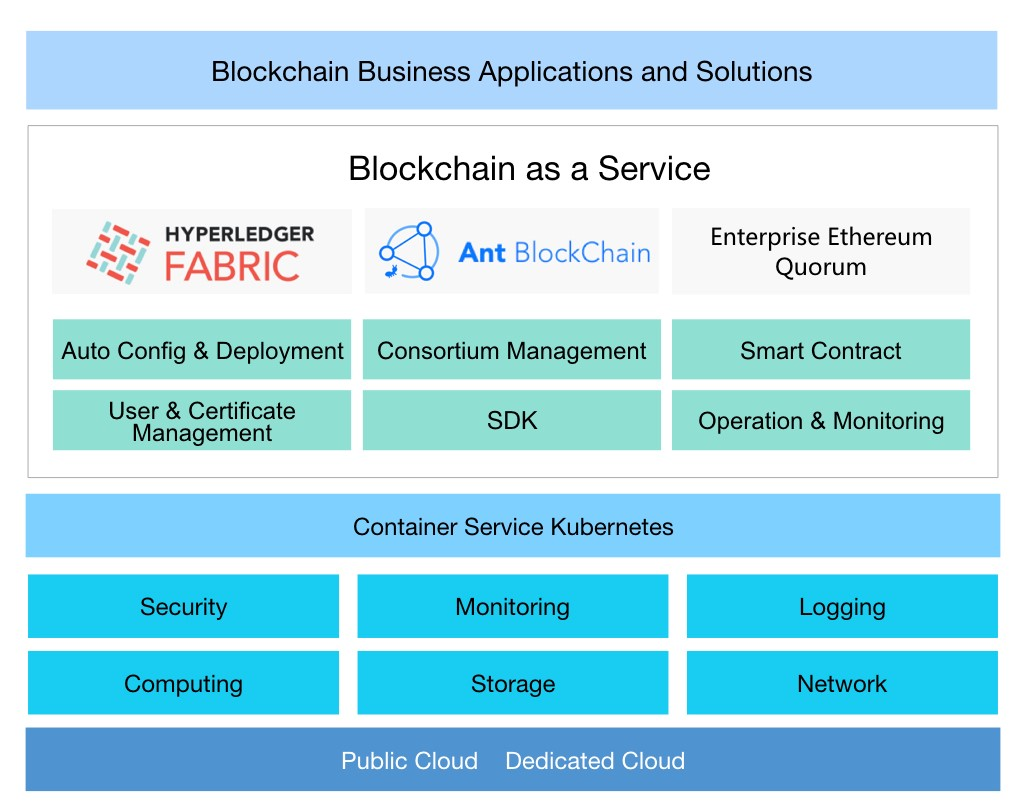Power your innovations with Alibaba Cloud FinTech Support Plan and save up to $5,000 for your cloud adoption.
By Afzaal Ahmad Zeeshan, Alibaba Cloud Community Blog author and Alibaba Cloud MVP.
Fundamentally, systems are nothing more than a network of two or more entities – producers and consumers, but transactions – the communication between them – often introduce intermediate layers that incur high costs, introduce complexity, and reduce transparency, when we need the exact opposite. Since decades, most of the businesses in digital age have been done via centralized bodies, such as banks etc. and that has been the norm of each transaction and contract being made. A single body is responsible for maintaining the records for each contract that has ever taken place between parties. Enter Blockchain – a game changer.
Simply, blockchain is a distributed and decentralized record keeping mechanism, a distributed ledger, where each transaction is verified by solving consensus models via mechanisms such as Proof of Work. Its peer-to-peer nature successfully eliminates the involvement of third parties, or the central bodies that control the overall ownership, thereby reducing the risk involved of fraud and increases transparency of the transactions.
The traditional approach involves a centralized system with singular administration and single point failure, and hence, more susceptible to cyber-attacks, easier to trick and cheat. It is also held back due to timing constraints, for example, transactions carried out in banks that can sometimes take days, and the more time a process takes, more is the cost and risk undertaken by the involved parties. Additionally, there exists the problem of infinite reproducibility of digital asset and security as a matter of infrastructure.
Contrast this to blockchain, which is decentralized and distributed, secured by cryptography, and allows and offers a mechanism where records can be created, and their modification and deletion is virtually impossible. It also has multiple backups, due to its peer-to-peer nature, and cleverly overcomes the issue of double spending, since it follows the principle of moving, rather than copying data. Moreover, a blockchain transaction is limited only by the time it takes to create a new block in the chain, which is usually ten minutes, but can be more or less than this average time depending on the load on the servers, and other pending transactions.
Blockchain comes in two flavours: public and private. We could utilize the existing frameworks to suit our needs or we could start from scratch, the latter approach most often required by enterprises due to regulatory requirements. Minimum cost incurred by both is inherent in blockchain technology – expense of computational power.
Moreover, private blockchain systems would also require a strong and distributed architecture, high security, and development as well as deployment costs.
Scalability of a blockchain is a matter of concern – especially for public networks – as the transaction rate for it is quite less when compared with the traditional transaction mechanism, e.g. Ethereum has a transaction rate of 20 TPS, while VISA can process at the rate of 24,000 TPS. However, continuous research is underway to triumph over this possible impediment. Normally these cases of scalability are a major reason why there are so many start-ups out there in blockchain, it is a fact that blockchain needs to find out a different model than Proof-of-Work model, to increase somewhat of its scalability.
Bearing in mind all these factors, we could say that the overall development and maintenance of a peer-to-peer blockchain project could take anywhere from 5000 USD up to 200k USD.
The biggest consumers of blockchain technology at present are cryptocurrencies, such as Bitcoin and Ethereum. The usage of this technology in the field of cryptocurrencies is so prevalent that people misunderstand, believing that blockchain is only for cryptocurrencies. As the world becomes more aware of the dynamics of blockchain, it is realizing its limitless potential, some of which include managing of healthcare records, voting process, and smart contracts. This is the reason why many organizations are already considering the usage of blockchain instead of classical model of contract and transaction fulfillment.
Having explained blockchain and its undeniable need to be incorporated in today's various systems, we integrate this technology with cloud to give Blockchain as a Service. A service that allows us to enjoy all the benefits of this revolutionary technology without worrying about the hassle of development and deployment and lets us focus on business innovation.
Based on top of Alibaba Cloud Container Service for Kubernetes, BaaS integrates with a wide range of Alibaba Cloud services to leverage the capabilities of its databases, security, computing, management, and maintenance. This allows organizations, such as yours, to quickly deploy the blockchain solutions on the cloud without having to monitor clusters of machines.
Alibaba Cloud BaaS provides blockchain services with varying architectures and at the time of this authoring, supports primarily three blockchain technologies:
BaaS justifies itself with the ease of its creation and quick deployment, as well as availably of graphical tools for management, and pre-configured infrastructure allows one to focus on adding value to the business. The following diagram from Alibaba Cloud's official documentation showcases some of the architectural support and setup of Blockchain as a Service solution,

We can add enterprises to the network dynamically. As the consortium blockchain is structured upon multi-tenant isolation of all resources, participants in the network can be independent and enjoy freedom in management of resources. Cross-regional networks are supported, and on-demand resource creation supports scalability.
The architecture of Blockchain as a Service comprises of four layers.
Foremost is the Infrastructure Layer in which we have two options, either to opt for a public cloud or a private one.
Next comes the Resource Layer consisting of computing, storage, and network resources, easily managed with an efficient management platform for resources on cloud, namely Apsara. Additional services include the likes of Elastic Computer Service (ECS), Virtual Private Cloud (VPC), Network Attached Storage (NAS), and Service Load Balancer (SLB), among many other offered by the cloud provider.
After the resource layer, we have the Platform Services Layer, where we observe the real power of blockchain services offered by Alibaba Cloud. Everything from swift resource creation to efficient management and operations, and uncompromising security. Few examples are Consortium Management, Node Management, Simple Upgrade/Migration, Blockchain Monitoring, Backup/Recovery, etc.
Lastly comes the Blockchain Middle-Application Layer, one tier below the business application layer, comprising of modules such as Business Logic & Data Processing, Smart Contract Management, Data Recording, and other blockchain functions. These services seamlessly integrate with the application layer via a simple API for Business Systems.
Alibaba Cloud BaaS API is built upon the native APIs of the blockchain technologies. It simplifies their complexities and enables better management and maintenance of the blockchain consortium and other modules. It supports both the HTTP and HTTPS requests and uses Access Key and Access Key Secret generated via Alibaba Cloud account for authentication. Added advantage is that we can manipulate both the blockchain as well as the cloud objects with a single API.
Alibaba Cloud BaaS aims to develop an integrated blockchain ecosystem for users that is efficient, open and standardized. To achieve transparency, its development results are shared with an open source blockchain community.
What sets BaaS apart from simple blockchain is that it is based on high-performance cloud servers such as ECS Bare Metal Instance that promise high-bandwidth network and increased concurrency along with high-throughput storage. Combination of such features results in a service providing enviable performance.
This enables you to quickly setup the node, and have it participating in the transactions without any delay—this service also utilizes the Alibaba Cloud network infrastructure, so that you are able to trust the high-availability of the service.
Alibaba Cloud has data centers all over the world, therefore, we have the option to deploy our businesses wherever we want. Additionally, we can utilize its compliance processes and practices to build a system that is secure and fully operational based on proven methods.
It is also recommended to create a cluster closer to our users, to provide a better latency performance to the customers. Since we can create a cluster in each region, we can look at a distributed solution by Alibaba Cloud too. This enables organizations to quickly deploy their solutions as needed, without having to provision a full-featured data center.
Using Alibaba Cloud BaaS, we can save on infrastructure, operational, and maintenance costs of blockchain technology, and instantly build enterprise-level blockchain networks that are easily configured, quickly deployed, and efficiently managed. Most of these operations are graphical, and you are provided with the controls that you can use to operate the clusters.
Alibaba Cloud BaaS offers end-to-end services marked by high availability. These services include administration of services, blockchain nodes, and container clusters. Bottom-layer storage of BaaS even boasts 99.99% reliability and can scale without effort or interruption.
Blockchain although itself has the foundations setup in security and cryptography, but with Alibaba Cloud's Blockchain service, security is at the heart of blockchain, which is why it is given paramount importance in BaaS. It provides encryption and decryption services based on China's recommended cryptographic algorithms.
On-chip encryption technology, such as ECS Bare Metal Instance, is used for securing private keys. Also present is the capability of network isolation, access control, protection against attacks, built-in risk control, as well as operational auditing.
Alibaba Cloud BaaS also has a consortium blockchain management system that caters multiple enterprises and promotes collaboration among them. At the same time, each can have independent CA service to meet their needs. Alibaba Financial Cloud also complies with Grade IV protection of Information Security and provides a multitude of services for uncompromising security.

2,593 posts | 793 followers
FollowAlibaba Cloud Indonesia - October 25, 2022
Alibaba Cloud Community - March 17, 2023
Alipay Technology - August 21, 2019
Alibaba BlockChain Service Team - August 29, 2018
Alibaba BlockChain Service Team - August 27, 2018
Alibaba Cloud Community - June 24, 2025

2,593 posts | 793 followers
Follow Blockchain as a Service
Blockchain as a Service
BaaS provides an enterprise-level platform service based on leading blockchain technologies, which helps you build a trusted cloud infrastructure.
Learn More ECS(Elastic Compute Service)
ECS(Elastic Compute Service)
Elastic and secure virtual cloud servers to cater all your cloud hosting needs.
Learn More Container Service for Kubernetes
Container Service for Kubernetes
Alibaba Cloud Container Service for Kubernetes is a fully managed cloud container management service that supports native Kubernetes and integrates with other Alibaba Cloud products.
Learn MoreMore Posts by Alibaba Clouder